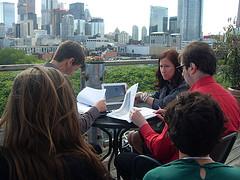Energy Sustainability In The Onshore Oil Exploration Energy
 In a finite planet, the dynamics of growth are not sustainable. Limits such as non-renewable natural resources, arable land and finite ecosystem’s capacity to absorb pollution human activity was the main thesis of the report a The limits of the Club of Rome in 1972, with the aim of calculating the economic growth and ecological footprint of the population on the land within the next 100 years. After the scientific community of the ’60s began to alert the authorities, on global issues like poverty, loss of biodiversity and environmental degradation and therefore conclude that the socioeconomic system needs to adapt to the ecosystem. The origin and the increased mechanization of production activities from the second half of the eighteenth century with the advent of the industrial revolution, leading to the search for greater production efficiency and thus greater need for energy use and burning of fuel. This background meant increased use of oil-largest generator of energy, present in both the solution needs such as transportation, and manufacturing of domestic instruments (boots, brushes and soaps), as a new business and search for oil extraction and business, for consumption at exorbitant volumes worldwide. However, lack of development of national and human experiences to the proper use of oil, eventually affecting humanity, biodiversity and the environment, and it is from this background, that happened several international conferences and commissions poured over issues relating to the objectives of environmental sustainability, development and energy. This article aims to survey and analysis on energy sustainability in the development stage of oil exploration on land, identifying the causes, intervening factors that put the environment. .
In a finite planet, the dynamics of growth are not sustainable. Limits such as non-renewable natural resources, arable land and finite ecosystem’s capacity to absorb pollution human activity was the main thesis of the report a The limits of the Club of Rome in 1972, with the aim of calculating the economic growth and ecological footprint of the population on the land within the next 100 years. After the scientific community of the ’60s began to alert the authorities, on global issues like poverty, loss of biodiversity and environmental degradation and therefore conclude that the socioeconomic system needs to adapt to the ecosystem. The origin and the increased mechanization of production activities from the second half of the eighteenth century with the advent of the industrial revolution, leading to the search for greater production efficiency and thus greater need for energy use and burning of fuel. This background meant increased use of oil-largest generator of energy, present in both the solution needs such as transportation, and manufacturing of domestic instruments (boots, brushes and soaps), as a new business and search for oil extraction and business, for consumption at exorbitant volumes worldwide. However, lack of development of national and human experiences to the proper use of oil, eventually affecting humanity, biodiversity and the environment, and it is from this background, that happened several international conferences and commissions poured over issues relating to the objectives of environmental sustainability, development and energy. This article aims to survey and analysis on energy sustainability in the development stage of oil exploration on land, identifying the causes, intervening factors that put the environment. .
